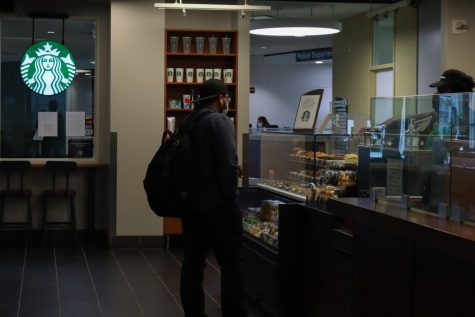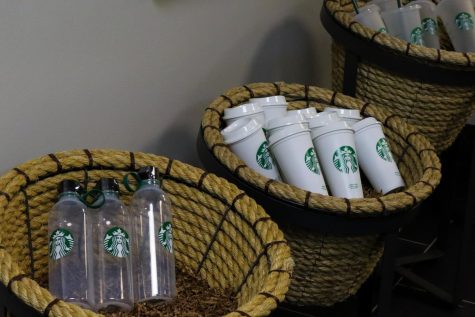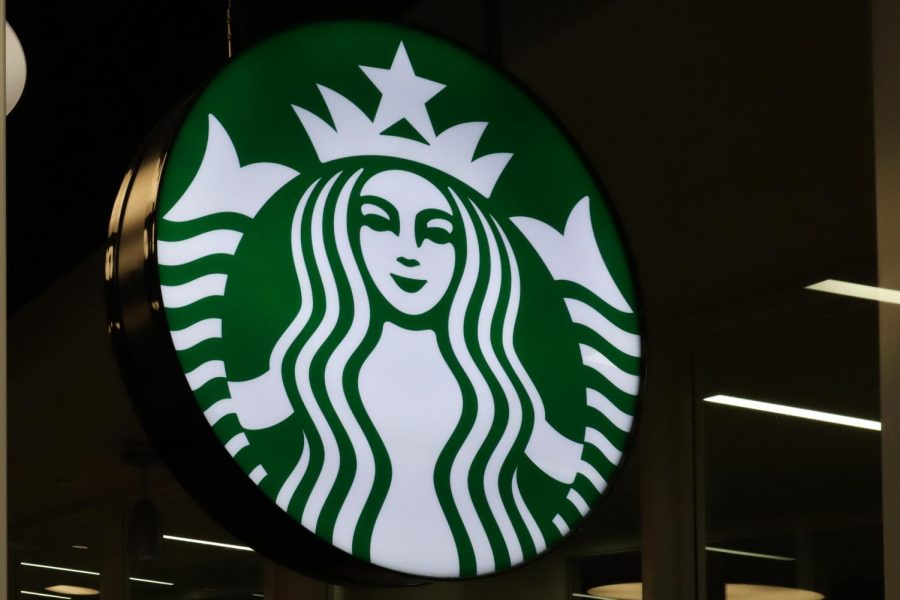College of DuPage Runs on Starbucks
October 11, 2021
“America runs on Dunkin’”? That’s nice, but according to just about everyone on campus, College of DuPage runs on Starbucks.
It’s officially fall at COD! More importantly, Oct. 1 marked National Coffee Day. And in an honorary fashion, I went around campus and interviewed COD students to document their favorite coffee orders and their thoughts on the Starbucks on campus.

Kimber Smith:
HB: What is your favorite drink or item from Starbucks?
Smith: I always love the pumpkin spice latte or the chai latte. I also like their ham and cheese croissants. Those are really good for a snack.
HB: Do you enjoy coffee on a regular basis?
Smith: I usually enjoy all types of coffee, but Starbucks is usually my main go-to because it’s the most convenient. I also enjoy coffee at home and at Dunkin’.
HB: Do you think having a Starbucks on campus is beneficial or inconvenient to students?
Smith: I definitely think it’s beneficial. You can see all the students form into a line, even [between] periods. It’s beneficial because a lot of students want to have Starbucks. Students are tired in the morning and want some caffeine.
HB: Do you think that caffeine impacts the mental and physical health of students in a negative or positive way?
Smith: I think it wakes people up, so I don’t think it really impacts them negatively.
Brandon Zima:
HB: What is your favorite drink or item from Starbucks?
Zima: I usually get the mango dragon fruit lemonade refresher. Coffee-wise I would get a caramel frappuccino or a caramel iced coffee.
HB: Do you drink coffee on a regular basis?
Zima: I do enjoy coffee. I usually have it a couple times a week. Sometimes instead of Starbucks I would get a caramel iced coffee from Dunkin’ Donuts or from McDonald’s. In the morning I would have a brew of hot coffee from home.
HB: How much do you spend at Starbucks – you don’t have to answer that.
Zima: $5 or $6 depending on the average coffee. I spend $2 or $4 at Dunkin’ Donuts depending on the size of [the] coffee.
HB: Would you want to see COD do anything different with their choice in coffee shops or fast food establishments? Do you want to see healthier options?
Zima: Possibly. They could add Dunkin’ Donuts, because a lot of people like Dunkin’ as well. They sell coffee, and they are cheaper as well for students who don’t want to spend so much.
HB: Do you think caffeine affects students’ mental and physical health in a positive or negative way?
Zima: I think it impacts them in a positive way because it wakes them up. But it’s not always as healthy because Starbucks drinks tend to have a lot of calories and sugar. So it can impact students in a negative way as well.
Not every COD student enjoys coffee, but this student has a lot to say about the culture around caffeine.

HB: Would you want to see COD do anything different with their choice in coffee shops or fast food establishments? Do you want to see healthier options?
Pereira: Definitely. Right now there is only Starbucks and Subway, so maybe something healthier may be better.
HB: Do you think having Starbucks on campus is beneficial or inconvenient to students?
Pereira: I think a lot of people drink coffee in general. Students like the Starbucks on campus, but it could be a problem for students financially. Because they spend a lot of money at Starbucks.
HB: How much money do you think people spend on Starbucks?
Pereira: I think students are spending at least $100 a month. Which is another reason why I wouldn’t want to go to Starbucks.
HB: Do you think that caffeine impacts the mental and physical health of students in a positive or negative way?
Pereira: I think it depends on how much a student drinks. Coffee normally gives you energy when you first start to drink it. But eventually you slow down, and you start to crash astronomically. It has a positive effect for a temporary amount of time, but as the day goes on, you start to lose energy.
HB: Do you think that too much caffeine intake can contribute to student burnout?
Pereira: I think so, especially sugar intake. If you drink black coffee, it should be fine. But Starbucks is incredibly unhealthy. A lot of it is just coffee, part milk and sugar. Students’ productivity will go down, as well.
Sarah Altab
HB: What is your favorite drink from Starbucks?
Altab: The one I’m drinking right now, the grande iced brown sugar oatmeal espresso.
HB: Ok! Do you normally like drinking coffee on an everyday basis? Is this the No. 1 place you would go to for food or refreshments?
Altab: Ah, no. This isn’t my optimal choice. I typically choose Celsius, just any type of energy drink. But lately I’ve been hooked on that type of coffee taste, which is why I’ve been regularly drinking it.
HB: Would you like to see COD do anything different with their options in Starbucks, coffee shops or other food options?
Altab: Yeah, the incorporation of oat milk or almond milk would be great because regular milk doesn’t have that many dietary benefits compared to vegan milk. But other than that I’m leaving, so it doesn’t matter to me anymore.
HB: Do you think having a Starbucks on this campus is beneficial or inconvenient to students?
Altab: Yeah, of course! And I think there has to be a way the line should get through faster because I know it can get pretty hefty.
HB: How much do you usually spend on Starbucks?
Altab: I spend $6 a day on coffee, so it totals out to at least $1,000 a year.
HB: Ok! That’s a lot of money. How do you think coffee impacts the mental and physical lives of students?
Altab: It doesn’t help with anxiety; it definitely adds to it for sure. But over time, I definitely believe we have become dependent on a source of energy. So if we don’t have it we start to get jittery or shaky. I do think there should be discipline when it does come to coffee, because if you drink it in excessive amounts it will have bad mental effects on you over time. Caffeine and anxiety don’t work hand in hand.
HB: Do you think that can contribute to student burnout?
Altab: No. I believe that student burnout is an individual process. If you believe that you are wearing yourself out, maybe you should re-arrange your schedule. It could be inevitable if you’re working in the medical field. That requires a lot of work, but I think student burnout can be avoidable.


















